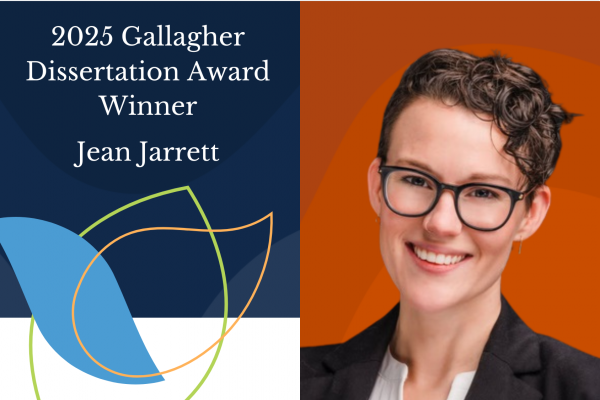
Jean Jarrett receives 2025 Gallagher Dissertation Award
Jean Jarrett, a graduate student in the department of health sciences speech and hearing sciences at the UNC School of Medicine, was recently named the winner of the 2025 James J. Gallagher Dissertation Award from the UNC Frank Porter Graham Child Development Institute (FPG). The award—which honors the legacy of the late Jim Gallagher, FPG director from 1970 to 1987—provides a $4,500 stipend for a work-in-progress that is reflective of Gallagher's legacy of advancing policy and practice that supports children and families.
In a letter of support, Jessica Steinbrenner, PhD, a faculty fellow at FPG and professor within the UNC School of Medicine, spoke of Jarrett’s dedication to conducting applied research to support autistic children, their families, and the practitioners who serve them. She also highlighted Jarrett’s special combination of intellectual curiosity and passion for research. “Not only does she get excited about different areas and aspects of research,” said Steinbrenner, “but she is always quick to make compelling connections to her own work and interests and takes the next step of putting all the pieces together to make a difference in the real world. She has a thirst for understanding the complexities and nuances of applied research questions that will inform policy and practice.”
We recently spoke with Jarrett about her work and the Gallagher award. Here’s what she had to say.
Tell us about your proposed research.
My dissertation focuses on developing and applying an observational coding system to better understand therapeutic alliance in interventions for young children with autism. Specifically, I am examining what child characteristics, clinician characteristics, and clinician behaviors influence therapeutic alliance.
What do you hope to learn from your work?
I hope to shed light on what therapeutic alliance looks like in practice when working with young autistic children and to identify the specific clinician behaviors that influence therapeutic alliance. My goal is to eventually use this knowledge to adapt the measure for clinical settings, providing clear guidance that can inform professional development and help practitioners strengthen their everyday interactions with young autistic children.
What motivates your research?
Before starting this PhD program, I spent ten years practicing as a clinician, and it was always clear to me how vital the therapeutic relationship is when working with young autistic children. In autism intervention, we use different words for this (e.g., rapport, attunement, synchrony) but I chose to focus on therapeutic alliance because it captures both connection and cooperation. Throughout my career, I’ve seen how important it is to have both, but this is not an easy balance to strike. Over time, I noticed differences in how these relationships formed and how much they seemed to influence a child’s progress. When I’d raise questions about how we could strengthen this piece of our work, many colleagues would say, “There are some things you just can’t teach.” I’m a bit stubborn and I don’t want to believe that. There may always be an element of art to building trust and connection, but I believe there are concrete, teachable skills that can help clinicians create strong relationships more consistently. I hope my research will be a first step toward showing that these skills can be defined, observed, and strengthened through training and practice.
What does the James J. Gallagher Dissertation Award mean to you?
Dr. Gallagher’s legacy is truly inspiring, and I am honored to receive this award at this stage in my doctoral journey. As a speech-language pathologist, behavior analyst, and parent of an autistic child, I recognize how much trust families place in the hands of service providers. This research is deeply important to me, and this award affirms the value of work that seeks to strengthen that trust and improve the support that autistic children receive. I am truly grateful for this support as I complete my dissertation.
If you’d like to support the James J. Gallagher Dissertation Award Fund, you can do so with a secure gift online.
Previous Gallagher Award Winners
Read about previous Gallagher Award winners:
2024 | FPG Announces 2024 James J. Gallagher Dissertation Award Recipient
2023 | Jennifer Stone receives 2023 James J. Gallagher Dissertation Award
2022 | Kelsey Thompson receives 2022 James J. Gallagher Dissertation Award
2021 | Sarah Pedonti receives 2021 FPG James J. Gallagher Dissertation Award
2020 | Research on Teacher Perspectives Earns Jordan McNeill the 2020 James J. Gallagher Dissertation Award
